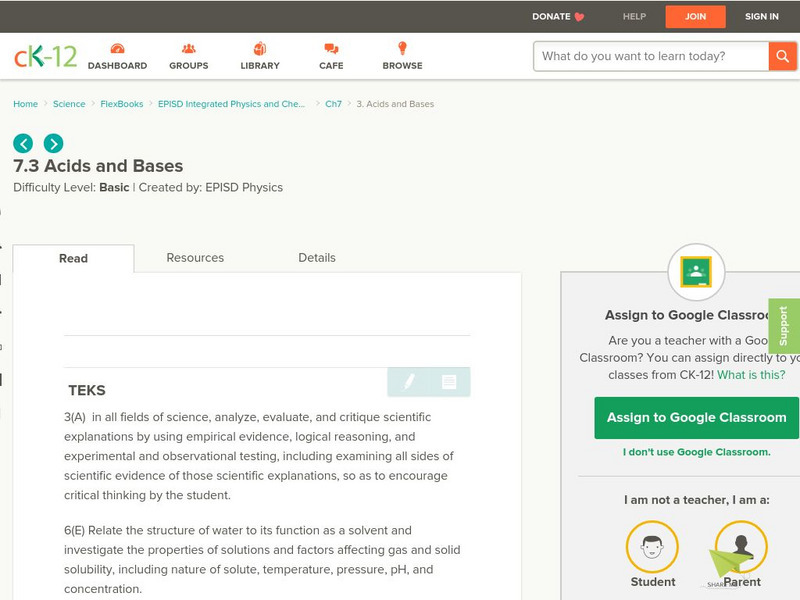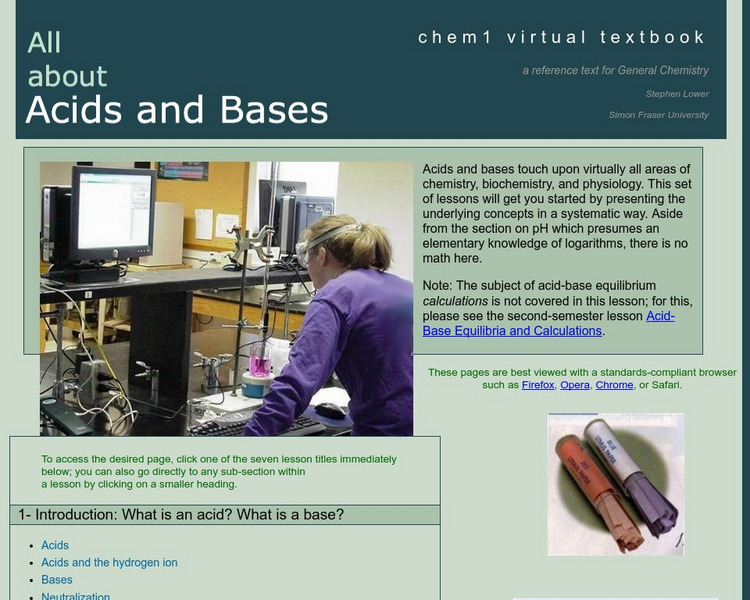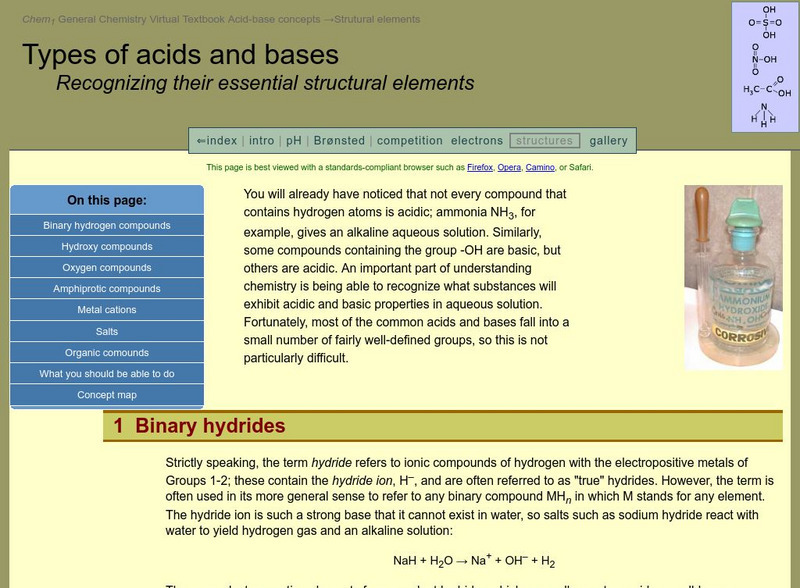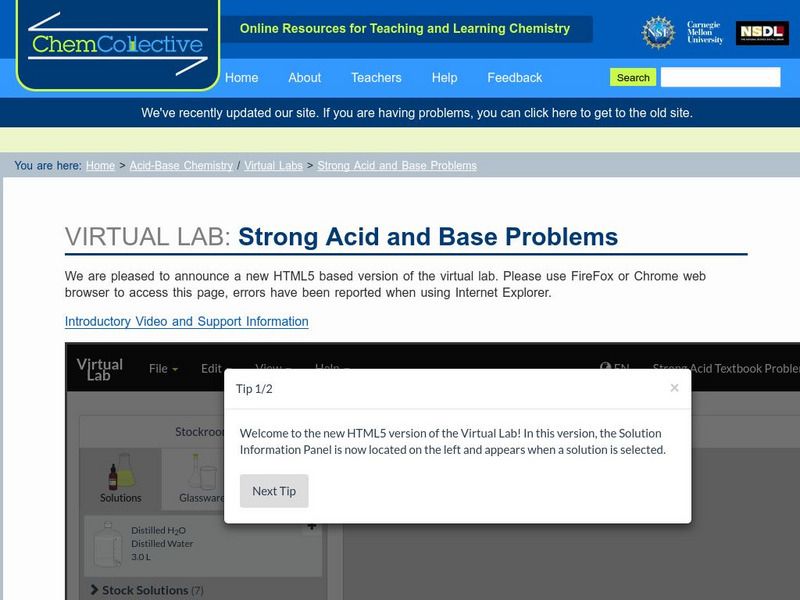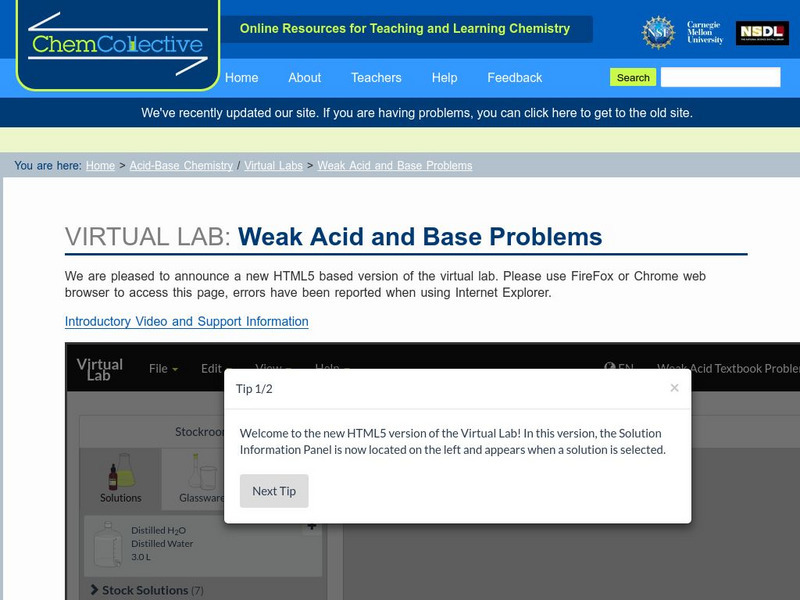Hi, what do you want to do?
Curated OER
Mixtures
Sixth graders experiment with mixtures. In this chemistry lesson, 6th graders determine which mixtures are considered heterogeneous, a suspension, a solution or a colloid. Students create a data sheet of what they discover.
Curated OER
ABOUT ALL YOU CAN EAT: Superfoods
Students trace back through time to see how the nutritional value of food consumed was enhanced. In this nutrients lesson students complete several activities that show the mass of food, and its PH value.
Curated OER
pH of Household Products
Tenth graders are provided with a piece of paper such as index, art, construction, or computer coating it with a universal indicator. They use cotton swabs HCl and NaOH to draw a picture repeating the same process using lemon juice and...
Curated OER
It's a Crash Test, Dummy
Pupils use the internet to research air bags in cars and trucks. In groups, they discover air bags history and the safety issues surrounding them. They create their own design of a new air bag and test it using a raw egg in experiments...
Curated OER
Science Show
Students research topics. They teach a lesson plan based on their chosen topic to other students.
Curated OER
Can Chromatography Separate A Pigment?
Students separate a mixture of pigments with ion exchange chromatography and predict whether the ion-exchange matrix is positively or negatively charged based on the type of pigment bonded to the matrix.
Curated OER
Natural Dye Lesson Plan
Young scholars investigate major pigments which occur naturally in fruits and vegetables, and to use them to dye a number of items. They study the effects of pH on anthocyanin on pigments.
Virginia Department of Education
Aspirin Analysis
Laughter may be the best medicine, but aspirin is also important. Young chemists analyze aspirin tablets using titration in this lab experiment. They then repeat the entire experiment using a different aspirin brand.
Curated OER
Separating a Starch-Glucose Mixture Using Gel Filtration
Pupils experiment using the basic principles of gel filtration. They use the gel filtration technique for testing for the presence of specific substances. Students discover that starch is a larger molecule than glucose.
Curated OER
DNA Isolation from Onion
Students apply measurement skills using the metric system. They explain the process of isolating DNA from other cell contents. They apply knowledge of cell structure to explain the process of isolating DNA.
Curated OER
Activity #17 Co2 From Alka Seltzer
Students observe what occurs when Alka Seltzer tablets are added to water. They explain why water stays in the jar when it is above the surface of the water. Pupils test for the presence of carbon dioxide by conduting the match test.
Curated OER
50 Ways to name Your Compound
In this compounds activity, students review the rules for naming compounds. Students apply these rules by writing the chemical name or formula for the 50 compounds given.
Curated OER
Elements Found in Living Things
In this elements instructional activity, students review the most common elements found in living things. Students color in two pictures with the percentages of the elements found in that living thing.
Curated OER
Industrialization of the American Landscape - Major Project
Students consider the role of industry on the American landscape from a variety of perspectives. They investigate a simulated case study. They investigate a chemical spill catastrophe. Students write an informative pamphlet to assist...
Curated OER
Invisible Ink - Demonstration
Students observe a demonstration that shows that the indicator, phenolphthalein, is a chemical that displays different colors depending on either the acidity or the basicity of the environment. They use the substance to reveal secret...
Wyzant
Wyzant: Acids and Bases
This site presents everything you need to know about acids and bases and more! Gives a nice description on what acids and bases are, properties of both, strong and weak acids and bases, an overview of pH, and much more.
Vision Learning
Visionlearning: Chemical Relationships: Acids and Bases
An explanation of historical ideas that lead to the current day concepts of acids and bases. The Concept of pH is briefly introduced.
CK-12 Foundation
Ck 12: Acids and Bases
[Free Registration/Login may be required to access all resource tools.] In this learning module, students investigate the different chemical and physical properties of acids and bases.
Chiral Publishing
Chiral Publishing: An Introduction to Chemistry: Bronsted Lowry Acids and Bases: Audio Book
Listen and learn as you discover definitions for acid, base, and acid-base reaction. View example formulas of Arrhenius and Bronsted-Lowry acid and bases.
Simon Fraser University
Chem1 Virtual Textbook: All About Acids and Bases
Acting as an overview from the General Chemistry Virtual Textbook, this site explores acids and bases and various topics connected to them, including electron pairs, proton donors, proton acceptors, acid-base reactions, and more.
Simon Fraser University
Chem1 Virtual Textbook: Types of Acids and Bases
Acting as an overview from the General Chemistry Virtual Textbook, this site explores topics related to the various types of acids and bases. The topics covered include binary hydrogen compounds, hydroxy compounds, oxygen compounds, and...
Chemistry Collective
Chem Collective: Strong Acid and Base Problems
Textbook-style strong acid and base problems that can be checked using the Virtual Lab.
Chemistry Collective
Chem Collective: Weak Acid and Base Problems
Textbook-style weak acid and base problems that can be checked using the Virtual Lab.
Other
Mountain Empire Community College: Biology and Chemistry: Acids and Bases
Learn how acids and bases are defined. Also read about examples of each and their chemical reactions.






















